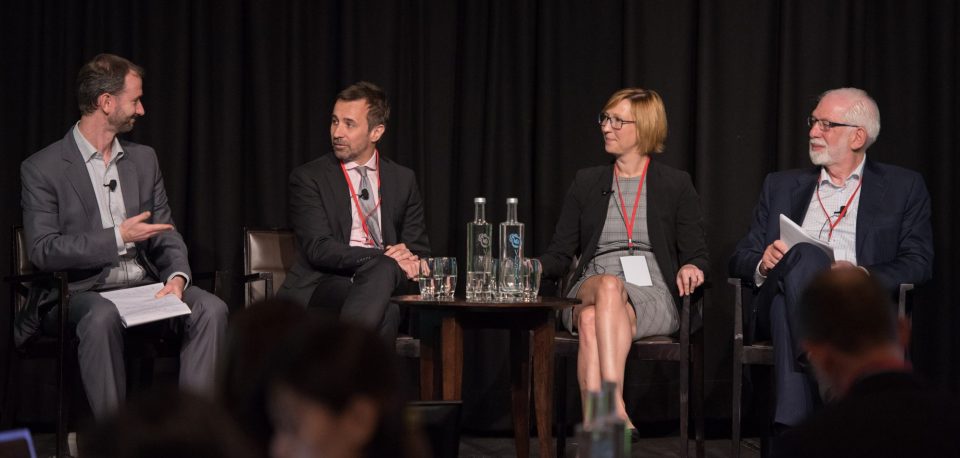
What is healthcare? – FOHS Plenary 1 report
Healthcare has progressed beyond immediate physiological needs, expanding to now consider quality of life and wellness, patient empowerment, social determinants and happiness.
Presenters at the Future of Health Seminar (FOHS) Plenary 1, Pia Clinton-Tarestad, Healthcare Strategy partner at Deloitte, Dr Henry Cutler, Director at Macquarie University Centre for the Health Economy (MUCHE), and Former Ethics Lecturer Chris White, set the backdrop for the day, discussing ‘what is healthcare’.

Healthcare is a relative concept dependent on the individual it serves and evolves with society’s development. At its very basic, it is a reactive service focussing on immediate survival needs – ensuring people don’t starve or succumb to deadly, infectious diseases.
We have seen exponential developments in healthcare over the past 100 years. Today, deaths from once common causes – diseases, childbirth – are a fraction of what they were.
How has healthcare changed over time?
[ngg src=”galleries” ids=”2″ display=”basic_slideshow” arrows=”1″ transition_style=”slide”]
What is healthcare today?

Healthcare has progressed beyond immediate physiological needs, expanding in both scope and time horizon. It now considers quality of life and wellness, patient empowerment, social determinants and happiness. Time horizon has moved from acute care to rapid recovery and preventative care. Technology has also enabled individuals to have greater certainty of their individual health, from ‘feeling well’ to ‘knowing they are well’.
Society’s increasing focus on the individual also presents itself in what we expect from our health system:
-
We want empowerment to be involved in decisions affecting our care
-
We want choice of care, even though we might choose “not to choose”
-
We want convenience
-
We want personalised care
Effective healthcare delivery needs to respond to demographic shifts, particularly relevant to Australia with its ageing population. This is particularly important because of how much healthcare needs vary by life-stage. The top 3 by age group are:
-
Ages 0-24: Infant/congenital, mental health, asthma
-
Ages 25-64: Musculoskeletal, mental health, cardiovascular
-
Ages 65+: Cardiovascular, dementia, cancer
Clearly, our needs are varied and require very different expertise and infrastructure.
Budgetary constraints force our health system to ration resources. Whilst the system tries to balance needs to meet our demands and expectations, eg. NSW Health aims to shift focus from an inputs and activity focus towards outcomes and experience, we invariably want more than can be delivered. Individuals do not receive the care they want/need and then follows a decision to self-fund, delay or go without. As a society, how comfortable are we with these outcomes?
Then follows the next aspect of healthcare – equity. Multiple dimensions of inequality need to be considered – geographical, socioeconomic, language, culture, indigenous status – when making decisions affecting the equity of healthcare.
“Equality DOES NOT MEAN equity. Equality is an objective measure. Equity is concerned with fairness and justice of social arrangements.”

Community expectations change over time. From Judeo-Christian origins with foundational elements of the sanctity of life and communal commitment to each other, a general shift in Australia is noted as society becomes less religious and more ethnically diverse. It is also increasingly based on end-focussed consequentialism: ‘greatest good for the greatest number’, at the risk of missing the needs of the minority.
Is it equitable to provide the same healthcare to individuals making good or poor lifestyle choices? Can we be sure of which outcomes are the result of choice? Other critical issues include:
- The future of public/private financing in light of continuing cost increases and the optional nature of private insurance with structural cross-subsidies between risk groups;
- Relative poor equity of the Australian healthcare system, likely to worsen if left unchanged;
- Allocation of funding, eg. Fund new drugs and treatments for rare conditions versus promoting healthier lifestyles.

Overall, plenary 1 provided a framing of what is healthcare and some of the ethical challenges that we face in allocating finite resources.
CPD: Actuaries Institute Members can claim two CPD points for every hour of reading articles on Actuaries Digital.







